Employee Empowerment, Emotional Intelligence, and Team Roles
VerifiedAdded on 2022/10/10
|6
|1343
|267
Homework Assignment
AI Summary
This management assignment explores key concepts in organizational design and leadership. It begins by discussing the significance of employee autonomy, highlighting its role in empowering employees and fostering a positive work environment. The assignment then delves into emotional intelligence (EQ), emphasizing its importance in employee behavior, interpersonal relationships, and conflict resolution within the workplace. It outlines the five factors of EQ and provides steps to increase it. Finally, the assignment examines the roles of group members in team dynamics, including task and maintenance roles, and addresses challenges such as communication gaps and leadership issues. The analysis emphasizes the importance of trust, commitment, and result-oriented behavior in achieving team success, while also differentiating between task-oriented and maintenance roles within a team.
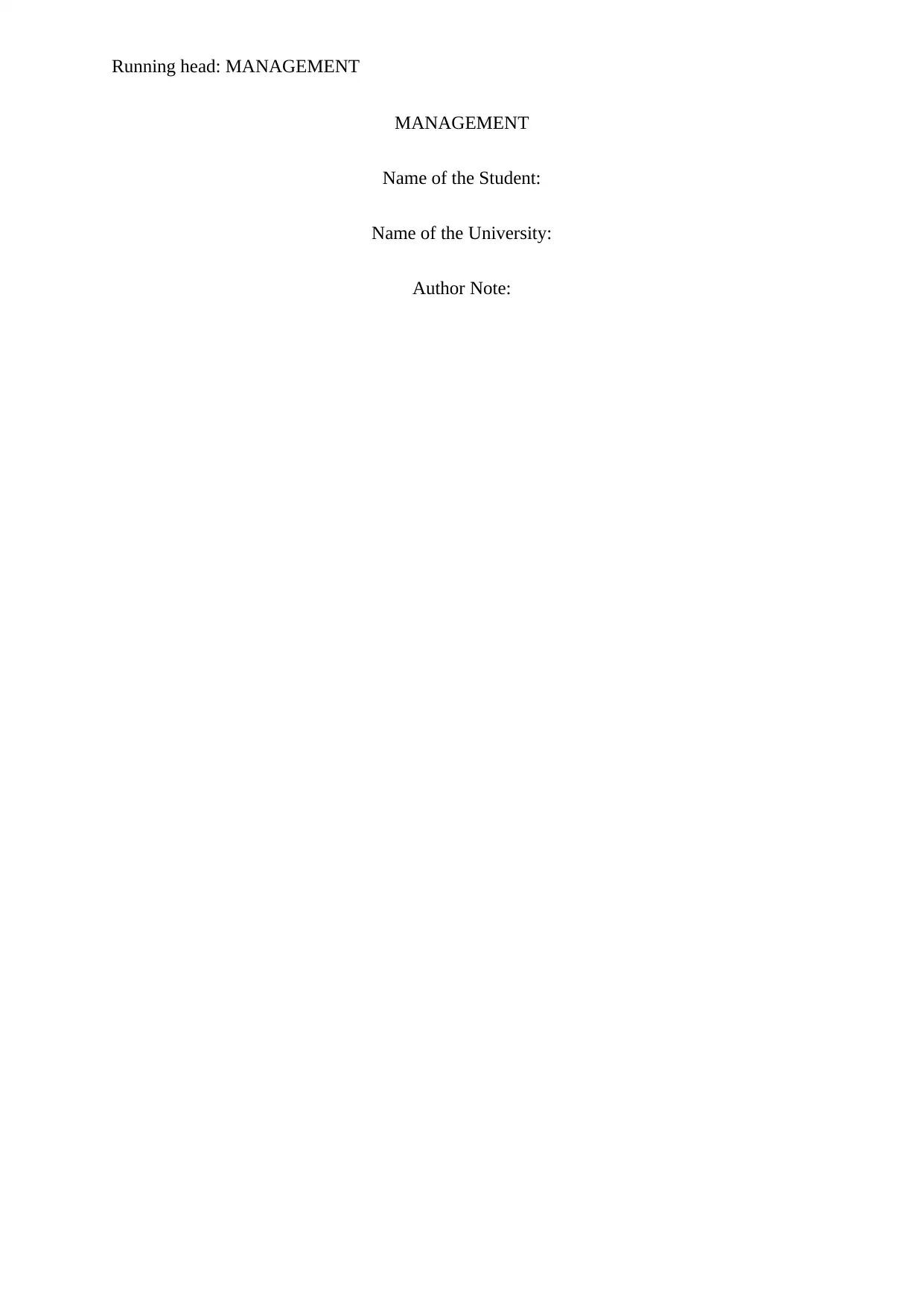
Running head: MANAGEMENT
MANAGEMENT
Name of the Student:
Name of the University:
Author Note:
MANAGEMENT
Name of the Student:
Name of the University:
Author Note:
Paraphrase This Document
Need a fresh take? Get an instant paraphrase of this document with our AI Paraphraser
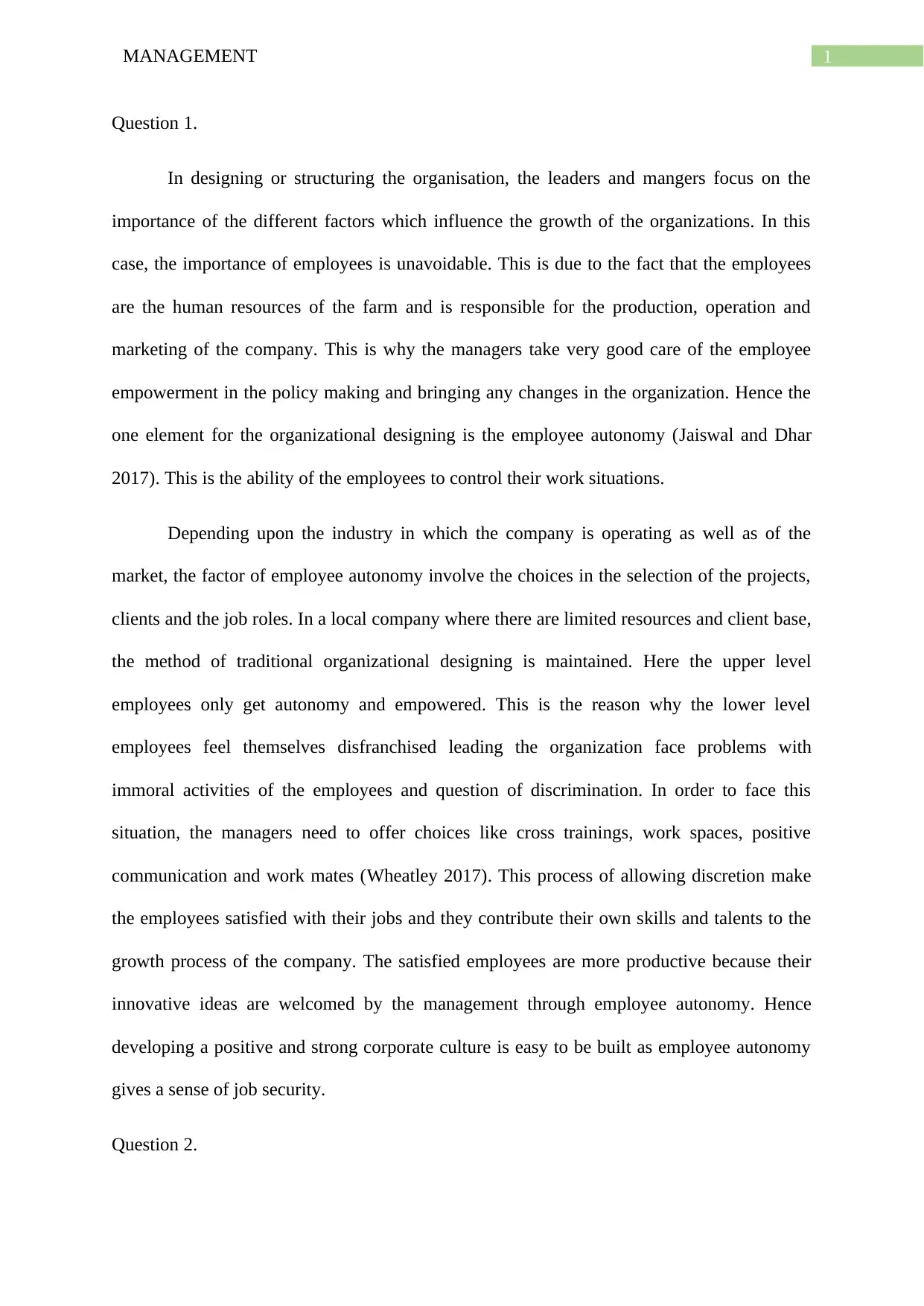
1MANAGEMENT
Question 1.
In designing or structuring the organisation, the leaders and mangers focus on the
importance of the different factors which influence the growth of the organizations. In this
case, the importance of employees is unavoidable. This is due to the fact that the employees
are the human resources of the farm and is responsible for the production, operation and
marketing of the company. This is why the managers take very good care of the employee
empowerment in the policy making and bringing any changes in the organization. Hence the
one element for the organizational designing is the employee autonomy (Jaiswal and Dhar
2017). This is the ability of the employees to control their work situations.
Depending upon the industry in which the company is operating as well as of the
market, the factor of employee autonomy involve the choices in the selection of the projects,
clients and the job roles. In a local company where there are limited resources and client base,
the method of traditional organizational designing is maintained. Here the upper level
employees only get autonomy and empowered. This is the reason why the lower level
employees feel themselves disfranchised leading the organization face problems with
immoral activities of the employees and question of discrimination. In order to face this
situation, the managers need to offer choices like cross trainings, work spaces, positive
communication and work mates (Wheatley 2017). This process of allowing discretion make
the employees satisfied with their jobs and they contribute their own skills and talents to the
growth process of the company. The satisfied employees are more productive because their
innovative ideas are welcomed by the management through employee autonomy. Hence
developing a positive and strong corporate culture is easy to be built as employee autonomy
gives a sense of job security.
Question 2.
Question 1.
In designing or structuring the organisation, the leaders and mangers focus on the
importance of the different factors which influence the growth of the organizations. In this
case, the importance of employees is unavoidable. This is due to the fact that the employees
are the human resources of the farm and is responsible for the production, operation and
marketing of the company. This is why the managers take very good care of the employee
empowerment in the policy making and bringing any changes in the organization. Hence the
one element for the organizational designing is the employee autonomy (Jaiswal and Dhar
2017). This is the ability of the employees to control their work situations.
Depending upon the industry in which the company is operating as well as of the
market, the factor of employee autonomy involve the choices in the selection of the projects,
clients and the job roles. In a local company where there are limited resources and client base,
the method of traditional organizational designing is maintained. Here the upper level
employees only get autonomy and empowered. This is the reason why the lower level
employees feel themselves disfranchised leading the organization face problems with
immoral activities of the employees and question of discrimination. In order to face this
situation, the managers need to offer choices like cross trainings, work spaces, positive
communication and work mates (Wheatley 2017). This process of allowing discretion make
the employees satisfied with their jobs and they contribute their own skills and talents to the
growth process of the company. The satisfied employees are more productive because their
innovative ideas are welcomed by the management through employee autonomy. Hence
developing a positive and strong corporate culture is easy to be built as employee autonomy
gives a sense of job security.
Question 2.
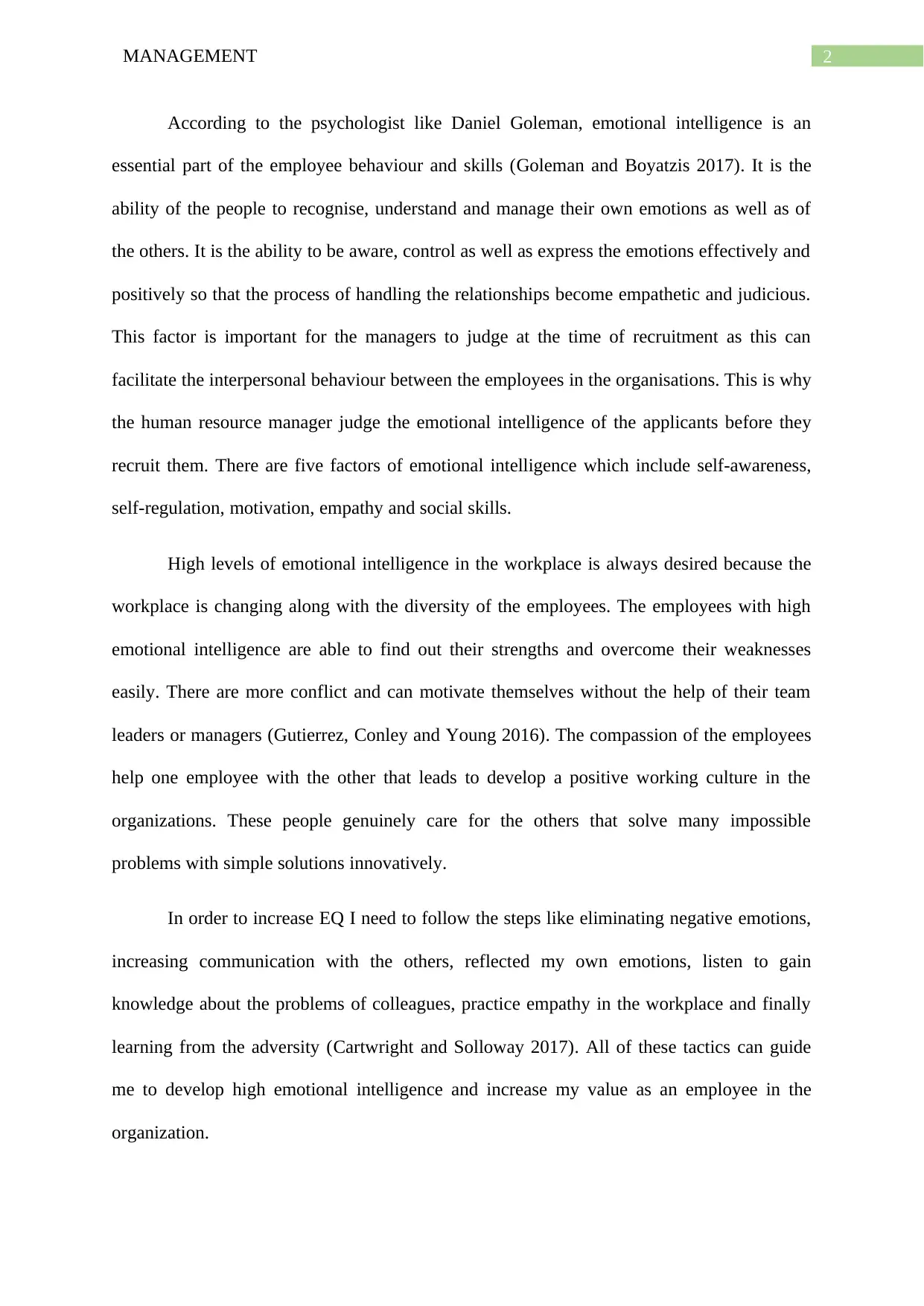
2MANAGEMENT
According to the psychologist like Daniel Goleman, emotional intelligence is an
essential part of the employee behaviour and skills (Goleman and Boyatzis 2017). It is the
ability of the people to recognise, understand and manage their own emotions as well as of
the others. It is the ability to be aware, control as well as express the emotions effectively and
positively so that the process of handling the relationships become empathetic and judicious.
This factor is important for the managers to judge at the time of recruitment as this can
facilitate the interpersonal behaviour between the employees in the organisations. This is why
the human resource manager judge the emotional intelligence of the applicants before they
recruit them. There are five factors of emotional intelligence which include self-awareness,
self-regulation, motivation, empathy and social skills.
High levels of emotional intelligence in the workplace is always desired because the
workplace is changing along with the diversity of the employees. The employees with high
emotional intelligence are able to find out their strengths and overcome their weaknesses
easily. There are more conflict and can motivate themselves without the help of their team
leaders or managers (Gutierrez, Conley and Young 2016). The compassion of the employees
help one employee with the other that leads to develop a positive working culture in the
organizations. These people genuinely care for the others that solve many impossible
problems with simple solutions innovatively.
In order to increase EQ I need to follow the steps like eliminating negative emotions,
increasing communication with the others, reflected my own emotions, listen to gain
knowledge about the problems of colleagues, practice empathy in the workplace and finally
learning from the adversity (Cartwright and Solloway 2017). All of these tactics can guide
me to develop high emotional intelligence and increase my value as an employee in the
organization.
According to the psychologist like Daniel Goleman, emotional intelligence is an
essential part of the employee behaviour and skills (Goleman and Boyatzis 2017). It is the
ability of the people to recognise, understand and manage their own emotions as well as of
the others. It is the ability to be aware, control as well as express the emotions effectively and
positively so that the process of handling the relationships become empathetic and judicious.
This factor is important for the managers to judge at the time of recruitment as this can
facilitate the interpersonal behaviour between the employees in the organisations. This is why
the human resource manager judge the emotional intelligence of the applicants before they
recruit them. There are five factors of emotional intelligence which include self-awareness,
self-regulation, motivation, empathy and social skills.
High levels of emotional intelligence in the workplace is always desired because the
workplace is changing along with the diversity of the employees. The employees with high
emotional intelligence are able to find out their strengths and overcome their weaknesses
easily. There are more conflict and can motivate themselves without the help of their team
leaders or managers (Gutierrez, Conley and Young 2016). The compassion of the employees
help one employee with the other that leads to develop a positive working culture in the
organizations. These people genuinely care for the others that solve many impossible
problems with simple solutions innovatively.
In order to increase EQ I need to follow the steps like eliminating negative emotions,
increasing communication with the others, reflected my own emotions, listen to gain
knowledge about the problems of colleagues, practice empathy in the workplace and finally
learning from the adversity (Cartwright and Solloway 2017). All of these tactics can guide
me to develop high emotional intelligence and increase my value as an employee in the
organization.
⊘ This is a preview!⊘
Do you want full access?
Subscribe today to unlock all pages.

Trusted by 1+ million students worldwide
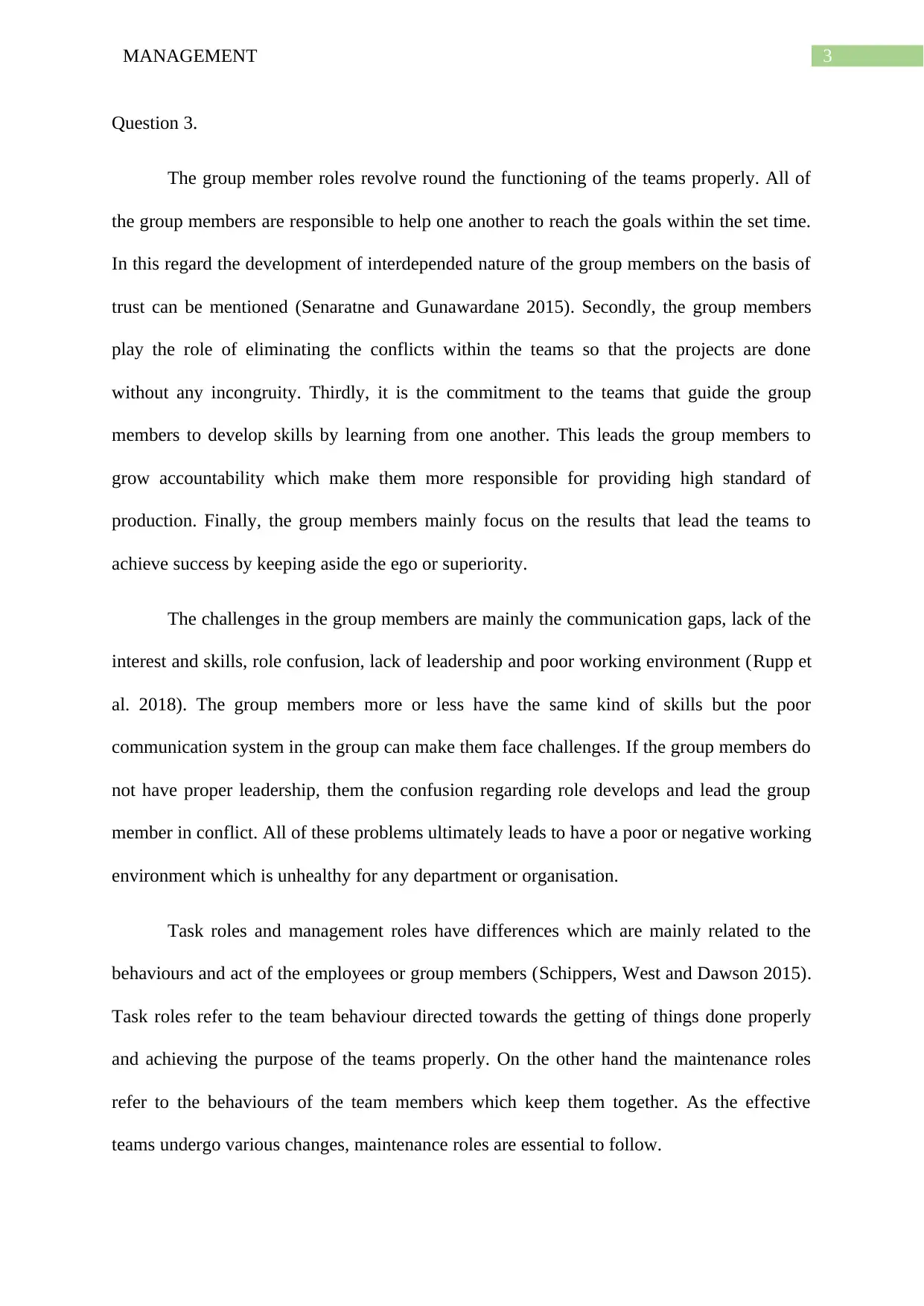
3MANAGEMENT
Question 3.
The group member roles revolve round the functioning of the teams properly. All of
the group members are responsible to help one another to reach the goals within the set time.
In this regard the development of interdepended nature of the group members on the basis of
trust can be mentioned (Senaratne and Gunawardane 2015). Secondly, the group members
play the role of eliminating the conflicts within the teams so that the projects are done
without any incongruity. Thirdly, it is the commitment to the teams that guide the group
members to develop skills by learning from one another. This leads the group members to
grow accountability which make them more responsible for providing high standard of
production. Finally, the group members mainly focus on the results that lead the teams to
achieve success by keeping aside the ego or superiority.
The challenges in the group members are mainly the communication gaps, lack of the
interest and skills, role confusion, lack of leadership and poor working environment (Rupp et
al. 2018). The group members more or less have the same kind of skills but the poor
communication system in the group can make them face challenges. If the group members do
not have proper leadership, them the confusion regarding role develops and lead the group
member in conflict. All of these problems ultimately leads to have a poor or negative working
environment which is unhealthy for any department or organisation.
Task roles and management roles have differences which are mainly related to the
behaviours and act of the employees or group members (Schippers, West and Dawson 2015).
Task roles refer to the team behaviour directed towards the getting of things done properly
and achieving the purpose of the teams properly. On the other hand the maintenance roles
refer to the behaviours of the team members which keep them together. As the effective
teams undergo various changes, maintenance roles are essential to follow.
Question 3.
The group member roles revolve round the functioning of the teams properly. All of
the group members are responsible to help one another to reach the goals within the set time.
In this regard the development of interdepended nature of the group members on the basis of
trust can be mentioned (Senaratne and Gunawardane 2015). Secondly, the group members
play the role of eliminating the conflicts within the teams so that the projects are done
without any incongruity. Thirdly, it is the commitment to the teams that guide the group
members to develop skills by learning from one another. This leads the group members to
grow accountability which make them more responsible for providing high standard of
production. Finally, the group members mainly focus on the results that lead the teams to
achieve success by keeping aside the ego or superiority.
The challenges in the group members are mainly the communication gaps, lack of the
interest and skills, role confusion, lack of leadership and poor working environment (Rupp et
al. 2018). The group members more or less have the same kind of skills but the poor
communication system in the group can make them face challenges. If the group members do
not have proper leadership, them the confusion regarding role develops and lead the group
member in conflict. All of these problems ultimately leads to have a poor or negative working
environment which is unhealthy for any department or organisation.
Task roles and management roles have differences which are mainly related to the
behaviours and act of the employees or group members (Schippers, West and Dawson 2015).
Task roles refer to the team behaviour directed towards the getting of things done properly
and achieving the purpose of the teams properly. On the other hand the maintenance roles
refer to the behaviours of the team members which keep them together. As the effective
teams undergo various changes, maintenance roles are essential to follow.
Paraphrase This Document
Need a fresh take? Get an instant paraphrase of this document with our AI Paraphraser
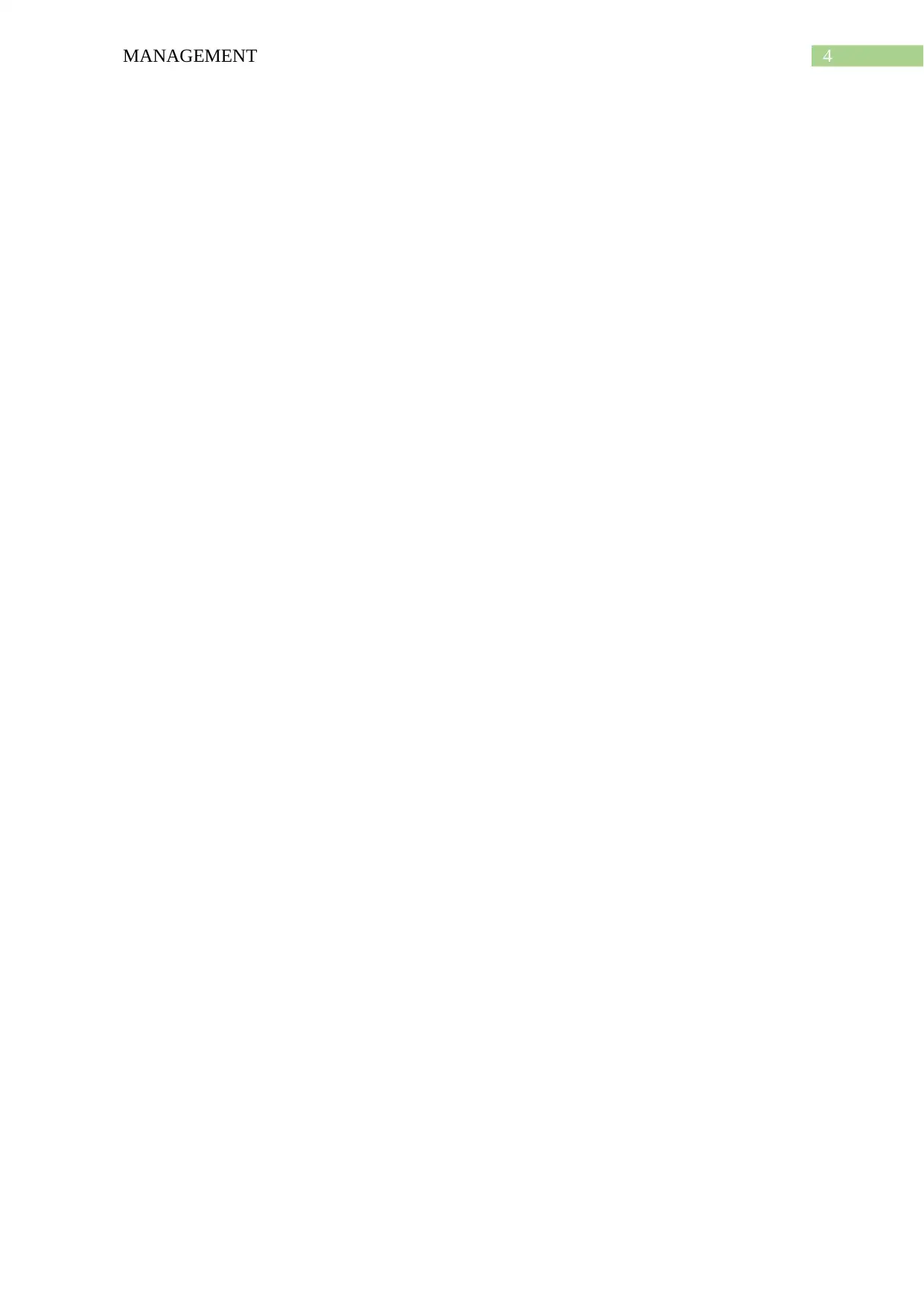
4MANAGEMENT
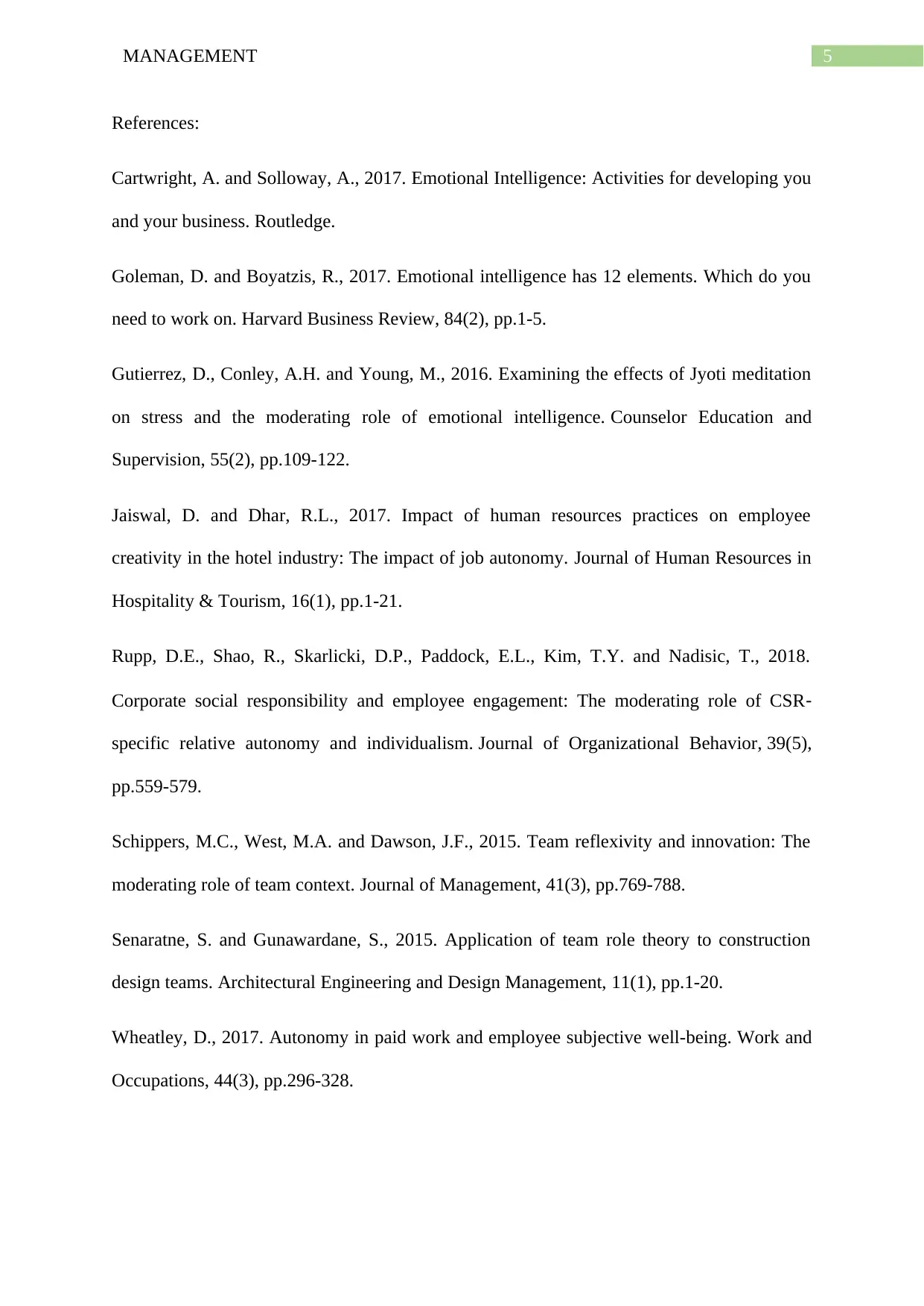
5MANAGEMENT
References:
Cartwright, A. and Solloway, A., 2017. Emotional Intelligence: Activities for developing you
and your business. Routledge.
Goleman, D. and Boyatzis, R., 2017. Emotional intelligence has 12 elements. Which do you
need to work on. Harvard Business Review, 84(2), pp.1-5.
Gutierrez, D., Conley, A.H. and Young, M., 2016. Examining the effects of Jyoti meditation
on stress and the moderating role of emotional intelligence. Counselor Education and
Supervision, 55(2), pp.109-122.
Jaiswal, D. and Dhar, R.L., 2017. Impact of human resources practices on employee
creativity in the hotel industry: The impact of job autonomy. Journal of Human Resources in
Hospitality & Tourism, 16(1), pp.1-21.
Rupp, D.E., Shao, R., Skarlicki, D.P., Paddock, E.L., Kim, T.Y. and Nadisic, T., 2018.
Corporate social responsibility and employee engagement: The moderating role of CSR‐
specific relative autonomy and individualism. Journal of Organizational Behavior, 39(5),
pp.559-579.
Schippers, M.C., West, M.A. and Dawson, J.F., 2015. Team reflexivity and innovation: The
moderating role of team context. Journal of Management, 41(3), pp.769-788.
Senaratne, S. and Gunawardane, S., 2015. Application of team role theory to construction
design teams. Architectural Engineering and Design Management, 11(1), pp.1-20.
Wheatley, D., 2017. Autonomy in paid work and employee subjective well-being. Work and
Occupations, 44(3), pp.296-328.
References:
Cartwright, A. and Solloway, A., 2017. Emotional Intelligence: Activities for developing you
and your business. Routledge.
Goleman, D. and Boyatzis, R., 2017. Emotional intelligence has 12 elements. Which do you
need to work on. Harvard Business Review, 84(2), pp.1-5.
Gutierrez, D., Conley, A.H. and Young, M., 2016. Examining the effects of Jyoti meditation
on stress and the moderating role of emotional intelligence. Counselor Education and
Supervision, 55(2), pp.109-122.
Jaiswal, D. and Dhar, R.L., 2017. Impact of human resources practices on employee
creativity in the hotel industry: The impact of job autonomy. Journal of Human Resources in
Hospitality & Tourism, 16(1), pp.1-21.
Rupp, D.E., Shao, R., Skarlicki, D.P., Paddock, E.L., Kim, T.Y. and Nadisic, T., 2018.
Corporate social responsibility and employee engagement: The moderating role of CSR‐
specific relative autonomy and individualism. Journal of Organizational Behavior, 39(5),
pp.559-579.
Schippers, M.C., West, M.A. and Dawson, J.F., 2015. Team reflexivity and innovation: The
moderating role of team context. Journal of Management, 41(3), pp.769-788.
Senaratne, S. and Gunawardane, S., 2015. Application of team role theory to construction
design teams. Architectural Engineering and Design Management, 11(1), pp.1-20.
Wheatley, D., 2017. Autonomy in paid work and employee subjective well-being. Work and
Occupations, 44(3), pp.296-328.
⊘ This is a preview!⊘
Do you want full access?
Subscribe today to unlock all pages.

Trusted by 1+ million students worldwide
1 out of 6
Related Documents
Your All-in-One AI-Powered Toolkit for Academic Success.
+13062052269
info@desklib.com
Available 24*7 on WhatsApp / Email
![[object Object]](/_next/static/media/star-bottom.7253800d.svg)
Unlock your academic potential
Copyright © 2020–2026 A2Z Services. All Rights Reserved. Developed and managed by ZUCOL.





